In the United States, we continuously hear that families are the backbone of our society. Is this really true? Do our policies and laws really reflect our cultural values?
In comparing our work-family policies to those of other industrialized nations — specifically, Germany, Italy and Sweden — Caitlyn Collins, assistant professor of sociology, identifies a chasm between the U.S. and Europe in support for mothers, fathers and children.
“We talk about families being the most valuable part of our lives. However, this rhetoric is not backed up with policies or laws that enable families the time and resources necessary to take care of one another.”
— Caitlyn Collins
“We talk about families being the most valuable part of our lives, the part that gives us meaning, hope, fulfillment in ways that we don’t get from anywhere else,” Collins says. “However, this rhetoric is not backed up with policies or laws that enable families the time and resources necessary to take care of one another — especially those families who most need support.”
Take Sweden, for example. After having a child, couples receive 480 days of paid leave. “And the government even offers a gender equality bonus for parents who split the parental leave time equally,” Collins says. “It’s literally a cash incentive to get men to take more leave.” Gender equality is a cornerstone of Swedish society. It’s built into their welfare law.
Can you even imagine that here in the U.S.?
“The United States is one of only two countries on the planet that doesn’t mandate maternity leave,” Collins says. “We have no universal child-care system; we have no minimum standard for vacation and sick days, with disastrous consequences on families, especially on the working mothers whom I interviewed.”
How might Americans modernize our cultural attitudes around breadwinning and caregiving? How might we develop the political will to implement policies that would help mothers and fathers be happier and healthier, and by extension do better work? These are among the questions Collins addresses in her new book, Making Motherhood Work: How Women Manage Careers and Caregiving, scheduled for release by Princeton University Press in January 2019.
Investigating complex issues of culture, policy and social inequality is precisely what sociologists are trained to do, and precisely why a sociology department was brought back to the university at this pivotal time in the country’s history, when inequality continues to rise.
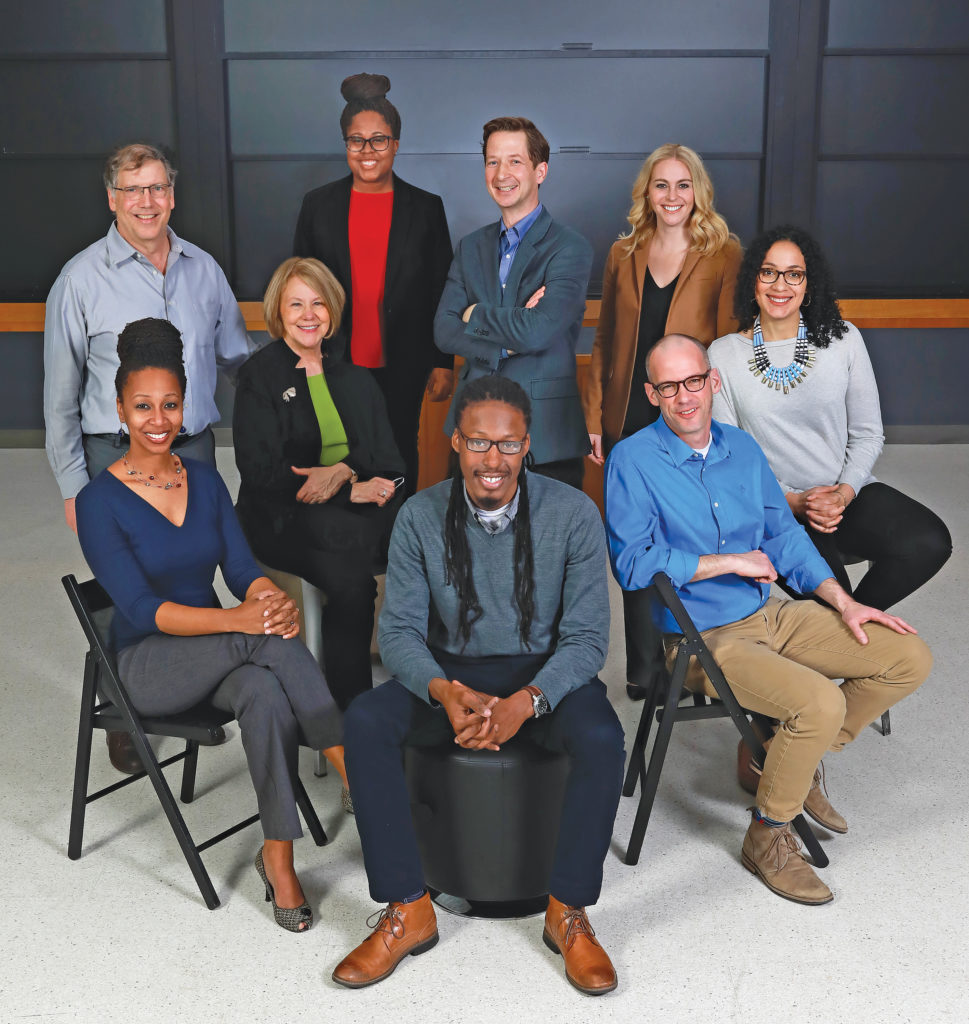
What sets sociology apart?
Since March 2014, when Barbara Schaal, dean of the Faculty of Arts & Sciences, first announced plans to relaunch the department, sociology at Washington University has grown rapidly.
A host of new faculty and students are once again exploring important societal questions from a sociological perspective — a vantage that eminent American scholar C. Wright Mills once described as the “sociological imagination.”
Mills defined that special form of imagination as enabling us “to grasp history and biography and the relations between the two within society.”
At Washington University, this sociological imagination is being rebuilt from scratch, yet the department’s new faculty are already making important contributions to the field. The first wave of faculty hires, who joined the university in the fall of 2015, included David Cunningham, Jake Rosenfeld and Adia Harvey Wingfield, all well-established scholars in the discipline.
Cunningham, a former professor and chair of sociology at Brandeis University, is a nationally recognized scholar on the causes and consequences of social conflict, especially the wide-ranging legacies of race-based hate groups and social movements. His book, Klansville, U.S.A.: The Rise and Fall of the Civil Rights-Era Ku Klux Klan (Oxford University Press, 2012), has been featured on NPR’s Fresh Air and CBS News and in a PBS American Experience documentary film.
Rosenfeld, who joined the department as an associate professor, came from the University of Washington, Seattle, where his research and teaching focused on the political and economic determinants of inequality in the U.S. and other advanced democracies. His recent book, What Unions No Longer Do (Harvard University Press, 2014), explores the consequences of organized labor’s ongoing decline. Frequently cited in the national press, the book has received widespread critical acclaim.
Wingfield, another recognized leader in the discipline, joined the team here after teaching and conducting research for nearly 10 years at Georgia State University. An expert on the workplace experiences of minority workers in predominantly white professional settings, she writes about the intersection of race, gender and class in the workplace. Having many academic publications to her credit, she also writes commentaries for the broader public that appear frequently in The Atlantic and other national outlets.
Wingfield’s most recent book, No More Invisible Man: Race and Gender in Men’s Work (Temple University Press, 2012), received a 2014 Distinguished Book Award from the Race, Gender, and Class Section of the American Sociological Association (ASA). In August 2018, she will receive the ASA’s Public Understanding of Sociology Award for her accomplishments and commitment to promoting public awareness of sociological ideas and scholarship.
“Sociology brings powerful research methods and tools to the discussion of a wide range of important issues facing the world today,” Wingfield says. “More than ever, we need to use our expertise on social issues to help shape national policies. We need to stand up and speak out for the disadvantaged and marginalized members of society.”
“Our sociology faculty work on some of the most critical issues that challenge our nation. They study issues like inequality and access. These are topics and questions that make a difference in the lives of millions of people, often the most vulnerable members of our society.
— Dean Barbara Schaal
Schaal concurs: “Our sociology faculty work on some of the most critical issues that challenge our nation. They study issues like inequality and access, from the arena of education to the labor market. These are topics and questions that make a difference in the lives of millions of people, often the most vulnerable members of our society. One reason I am grateful that we were able to restart our sociology department is because these issues are more pressing and relevant now than ever. It feels like a very important time to do this work.”
Taking a leap of faith
Dean Schaal’s decision to bring back the department came almost exactly 25 years after the university announced in April 1989 that it would phase out its sociology department, one considered too small and expensive to rebuild in an era of tight budgets.
In the few years since its return, the department has grown into a thriving, close-knit community with a fresh energy and big appetite for new ideas. With nine full-time faculty and a handful of affiliated professors and postdocs, the department will offer 27 undergraduate courses during the 2018–19 academic year. Course offerings — covering the spectrum from inner-city housing to global corporate responsibility — are attracting students from business, psychology, medicine and many other disciplines across the university. Further, the department will welcome four new postdoctoral research scholars this fall and is working steadily toward the creation of a graduate program.
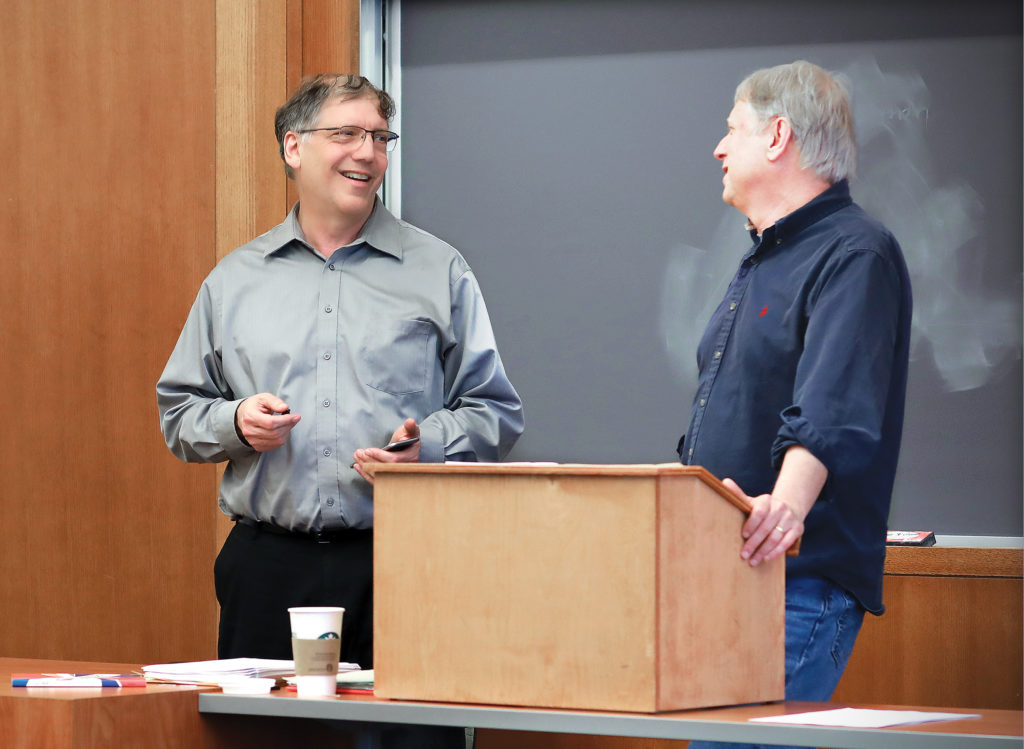
(James Byard/Washington University)
“The first wave of faculty hirings was very solid, and that has been crucial in the department’s early success,” says Steven Fazzari, a longtime professor in Arts & Sciences who was called on to lead sociology’s resurrection.
“In some respects, it was a leap of faith on their part,” Fazzari says. “Strong researchers, they had options to go to a lot of great places, but they decided to take a chance and come here. They told us that they saw this as a once-in-a-lifetime opportunity to build a new department from scratch.”
Fazzari, the Bert A. and Jeanette L. Lynch Distinguished Professor of Economics and a member of the university faculty for more than 30 years, is a nationally recognized macroeconomics scholar with a focus on economic inequality. And although he was part of the faculty advisory team formed to consider sociology’s reintroduction, Schaal’s invitation to head the new department initially caught him off guard.
“I had been co-teaching an interdisciplinary course called ‘The Economic Realities of the American Dream’ for several years, so I was familiar with the effects of poverty, job loss and other issues that sociologists deal with in their research. But somehow I wasn’t sure it made sense for an economist to lead a sociology department,” he says.
Fazzari’s doubts began to ease after in-depth discussions with Roddy Roediger, the James S. McDonnell Distinguished University Professor, who championed the restoration of sociology in his role as dean of academic planning. Roediger would co-chair the search committee with Fazzari that attracted the first faculty hires. Fazzari’s longtime friend and colleague Mark Rank, his teaching partner for the “American Dream” course, also provided critical support. Rank, the Herbert S. Hadley Professor of Social Welfare, has had a successful career on the Brown School’s social work faculty since transferring there from sociology in 1989.
Rank is an expert on issues of poverty, economic inequality and social justice. His research shows that a majority of Americans will have a brush with poverty at some point in their lives, either experiencing it directly or using a social safety net program to escape it.
“Sociology is such a broad discipline and has so many areas we could focus on, but we kept coming back to issues of inequality.”
— Mark Rank
Together, Rank and Fazzari realized that their interdisciplinary “American Dream” course offered a strong starting template for a renewed program in sociology, one that would broaden the focus in their course on economic inequalities to include disparities influenced by race, gender, education, class, immigration status and other social and demographic factors.
“Sociology is such a broad discipline and has so many areas we could focus on, but we kept coming back to issues of inequality,” Rank says. “That’s what our ‘American Dream’ course is all about, exploring this idea that the country is supposed to work according to these lofty principles, but in reality it doesn’t. There are lots of economic and sociological reasons why people may never realize their dreams.”
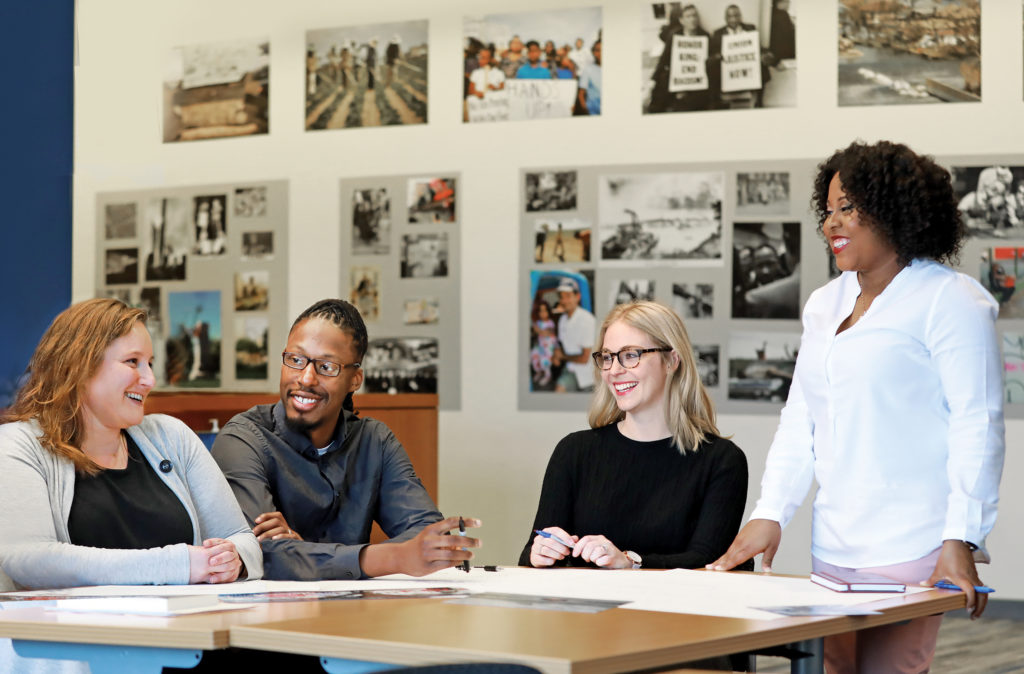
Building from scratch
Although the outlook for sociology’s return to campus seemed bright, Fazzari and Rank realized that the process of building a brand new academic program — especially one that aimed to quickly take its place among top-tier research programs around the country — would require navigating some considerable risks.
Success was far from guaranteed, especially at a university that some in the discipline still blamed for turning its back on sociology nearly a quarter-century earlier.
Schaal also recognized the challenges. “I went into this with cautionary voices in my ear telling me how difficult it would be to attract top talent,” she says. “I knew it would be challenging, but I also felt very strongly that this was a necessary step. Sociology is an essential discipline today, a cornerstone in the social sciences. You really can’t have a comprehensive research university without it. Our students were clamoring for more classes in this area as well as the opportunity to pursue a major.”
The advisory committee’s initial plan, approved by Schaal, was to hire two faculty members each year for five years, but questions remained about where to begin the hiring process. And there were also big logistical issues to consider.
One of the biggest challenges was figuring out how to bring all the important pieces together incrementally — how to lure a core group of senior faculty with the promise of what might lie ahead.
Established PhD programs rely on a whole framework of traditions and norms that scholars new and old often take for granted. Senior research faculty expect to have graduate students around to partner with on research projects and to share in teaching activities. Sociology’s rising stars might be hesitant to join a fledgling undergraduate program that lacked the intellectual support and partnerships that graduate students typically provide in return for mentoring.
One of the biggest challenges was figuring out how to bring all the important pieces together incrementally — how to lure a core group of senior faculty with the promise of what might lie ahead.
“We had to offer some guarantee to faculty recruits that we had a plan to reach critical mass fairly quickly,” Fazzari says. “Yet, we had a good story to tell. I don’t think there’s ever been a university that’s announced plans to hire 10 sociology professors in five years. In the end, it was the university’s strong commitment to making this happen — and doing it right.”
To get around any start-up hurdles, Fazzari, Roediger, Rank and nine other senior faculty members on the search committee focused first on attracting tenure-ready scholars in the prime of their careers who were doing important work in the field. To ease concerns over the initial lack of graduate students in the program, they encouraged each new recruit to bring along a promising postdoc who shared their research interests.
The approach has been so successful that the department plans to expand the effort, attracting new postdocs and building the department’s reputation as a valuable stepping stone for postdocs just beginning their academic careers. The strategy provides faculty with the partnerships they need and the intellectual energy that comes from newly minted scholars, while helping postdocs build their teaching and research résumés, including the opportunity to co-author important research with established scholars and teach talented undergraduates.
One such postdoc is Patrick Denice, who worked on research as a graduate student with Jake Rosenfeld when both were at the University of Washington. After earning his doctorate in 2016, Denice followed Rosenfeld to Washington University where he continues to co-publish important research on labor, wages and pay transparency, some of which has been cited in high-profile news coverage at The New York Times, PBS News, The Atlantic and Salon.
Denice, who is currently working with Rosenfeld on a National Science Foundation–funded study on “Pay Secrecy Policies and Pay in U.S. Workplaces,” was recently hired as an assistant professor at Western University in Ontario, Canada. Another early postdoc hire, Koji Chavez, will move on this fall to a tenure-track position at Indiana University.
As it turns out, the hardest part of the department’s hiring process has been whittling down the choices from very strong applicant pools. After initially planning to add two faculty per year, the department hired three in both the first and second year, as some candidates proved too good to pass up and top candidates added highly valued diversity to faculty ranks.
In the second wave of recruiting, for example, the department received more than 300 applications for its junior faculty positions. In 2016, three recent doctoral graduates with promising research agendas joined as assistant professors in the department: Caitlyn Collins from the University of Texas-Austin, John Robinson from Northwestern University and Ariela Schachter from Stanford University.
For 2017, the department returned the hiring focus to building senior leadership, bringing in three new scholars as full professors with tenure. The hires included Hedwig “Hedy” Lee, a scholar of health inequality from the University of Washington, and Tim Bartley, an expert on transnational governance, corporate social responsibility and social movements from Ohio State University. Cynthia Feliciano, who studies acculturation among second-generation Latin and Asian immigrants, will join the department this fall. Also, taking an active role is Odis Johnson, an expert on urban education and community policing who holds dual appointments as associate professor in the departments of education and sociology.
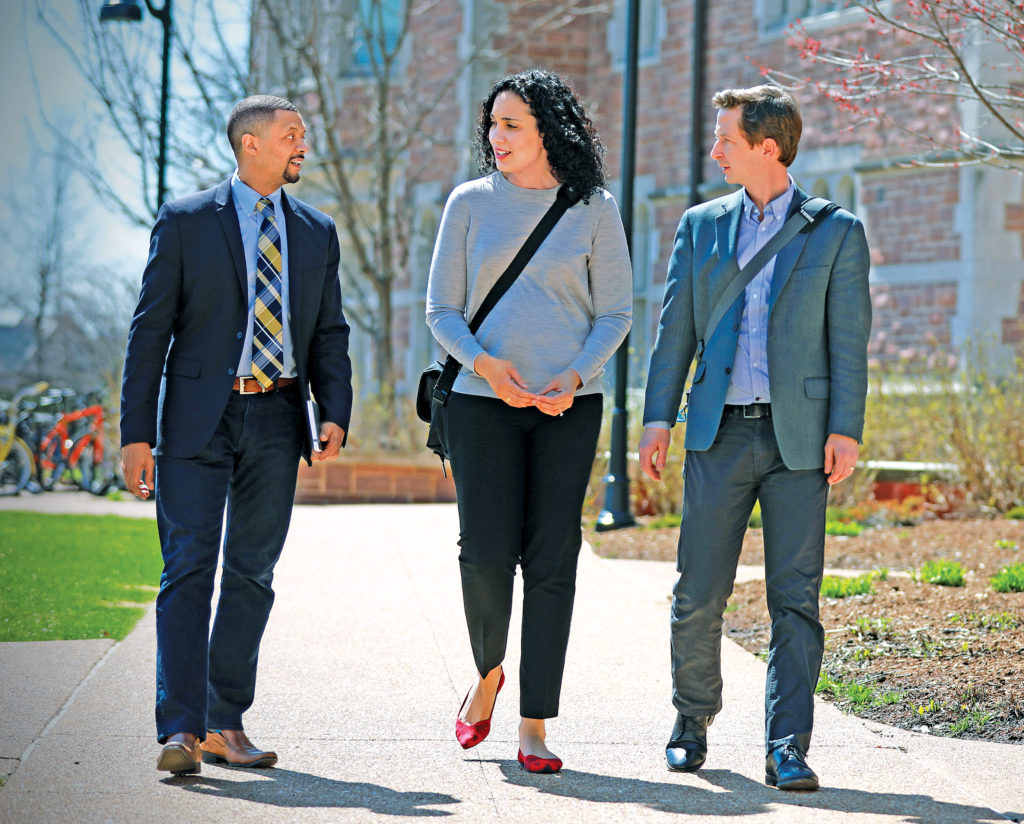
A big vision
“Everyone here is so focused on doing work that matters,” says Schachter, who studies how Americans support and impede immigrants’ integration into life in the United States. “Each of my colleagues has a big vision about what sociology can do to address key social issues, problems with society that seem to matter now more than ever. We’re all excited to be working together on these problems. The sense of community is very strong.”
Schachter’s recent research has shown that Americans’ views of immigrants are strongly influenced by their perceived legal status, a timely topic in an era when undocumented immigrants as a group have been unjustly described as rapists and murderers. Schachter is now working with postdoctoral fellow John Kuk to explore how residential segregation, inequality and discrimination influence the odds that immigrants will find decent housing options.
Robinson’s research examines housing options and how macroeconomic changes have redefined the politics of race, poverty and neighborhood inequality within and around American cities. His current work, a mixed-methods study of the “affordable housing” industry in the U.S., offers an early and important case for understanding the growing role of finance in antipoverty programming and forms the basis of his manuscript-in-progress, Liquid City: Affordable Housing and the Politics of Racial Inequity in the Age of Finance.
For Bartley, his research interests date back to his graduate days at University of Arizona. As he was studying theories of regulation, he was participating in campus protests over sweatshops. He eventually figured out how to combine both interests.
His latest book, Rules Without Rights: Land, Labor, and Private Authority in the Global Economy (Oxford University Press, 2018), explores how consumer boycotts and other pressures force global corporations to create new policies to address public concerns over fair-labor standards and environmental sustainability. Based on research in China and Indonesia, the book looks at whether and how these policies are implemented and what difference they make on the ground.
Bartley also has commented on other cases in which companies go beyond what is legally required or step in where governments fear to tread. After the 2018 shooting at Marjory Stoneman Douglas High School in Parkland, Florida, two U.S. retailers, Dick’s and Walmart, both made moves to regulate their gun sales based on principle — moves that legislators had failed to make in recent years despite public outcry following each mass-shooting tragedy. Bartley says these actions signify “an expansion of corporate social responsibility,” although he’s uncertain of their impact. “After all, by one recent count, there are more than 50,000 gun stores in the U.S.,” he says.
“Sociologists are good at interdisciplinary projects and interaction because they specialize in collecting all these different pieces of social structure that are going on around an issue.”
— Steven Fazzarri
Bartley is also part of an interdisciplinary team looking at how media, marketing and technology companies, such as Facebook, exploit big data analytics to profit from personal information made available on social media. Here, too, they find companies creating their own rules for reviewing the ethics of these endeavors, in part due to the threat of impending government regulation.
“Sociologists are good at interdisciplinary projects and interaction because they specialize in collecting all these different pieces of social structure that are going on around an issue,” Fazzari says. “They offer a fresh perspective that would not be there without sociology, bringing a breadth of understanding and a unique, big-picture perspective to many issues that are studied by other disciplines.”
Already these interdisciplinary connections are translating into new opportunities for students.
One course under development, “Inequality and the City: Mapping the Ecology of Urban Segregation,” is a research-based capstone course for undergraduate students in sociology, architecture and urban design. The seminar, to be team-taught by sociologists Collins and Cunningham and architect and urban designer Patty Heyda, will examine the history, (re)development and lived experience of urban segregation in St. Louis.
And Johnson, in a research project funded by the university’s Institute for Public Health, has led an interdisciplinary team of researchers in education, social work and medicine in the creation of one of the nation’s most comprehensive databases of fatal interactions with police. He invited students and scholars from across the country to take part in a two-day symposium in spring 2018 to talk through the project’s findings and plan strategies with local police and community leaders to improve law enforcement–community relations both on the streets and in schools.
The opportunity for cross-campus research and teaching partnerships has been a big draw for faculty recruits to sociology, but the biggest enticement may well be the university’s setting in St. Louis.
Lee, for example, who studies the social determinants of health, was excited to join the department because St. Louis offered such a wealth of opportunities to take her research into nearby neighborhoods where racial and economic disparities abound.
She is working with several faculty around campus on issues related to mass incarceration, including plans to interview the immediate families of prison inmates, mostly women and children, whose lives outside the walls are also dramatically altered by long prison sentences.
“I’m excited to be part of the St. Louis community,” Lee says. “So many good things are going on here, but it’s also clear that there’s a lot of work to be done in terms of addressing inequalities. Part of the fun is getting the chance to work with my colleagues to help figure out what the changes needed will look like. We’re all ready to roll up our sleeves and dig in.”
It’s clear that students are ready to dig in, as well. “Undergraduate interest has exploded,” Fazzari says. “All of our courses are full, and we’re expanding offerings to meet demand. We’ve been fortunate to hire faculty who are outstanding teachers, and that, along with the compelling topics covered in our courses, has translated into enormous enthusiasm from our students.”
“We were able to recruit an amazing cadre of faculty, some of the most dynamic sociologists in the country,” Schaal says. “I am so delighted with what they’ve accomplished so far and the contributions they are making on campus.”
Gerry Everding is the senior news director of social sciences in Washington University’s Office of Public Affairs.
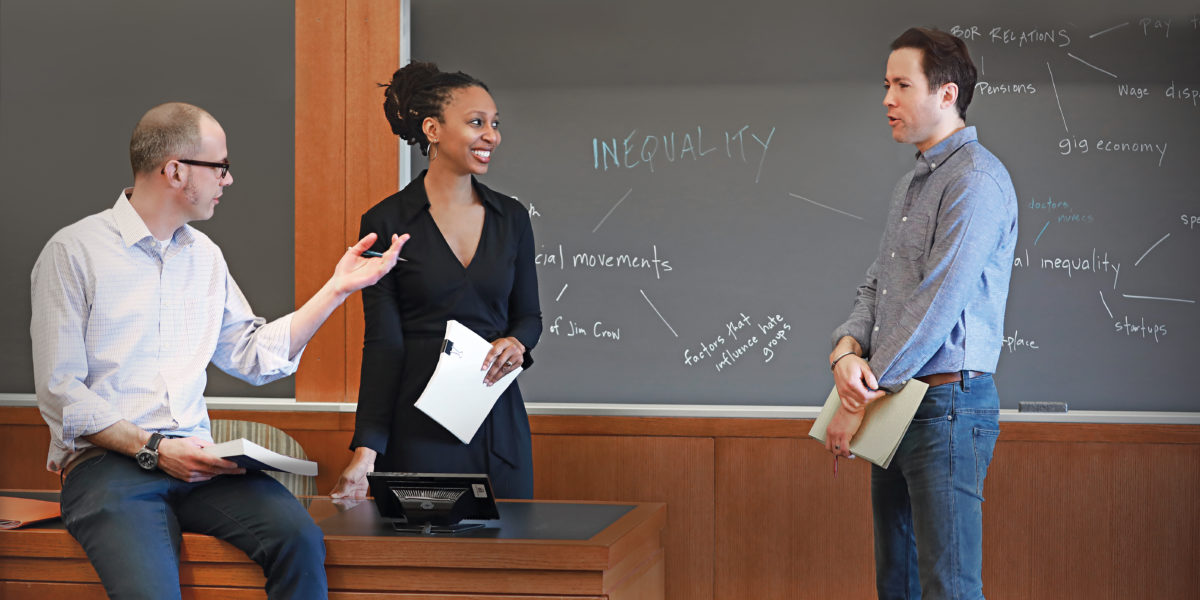
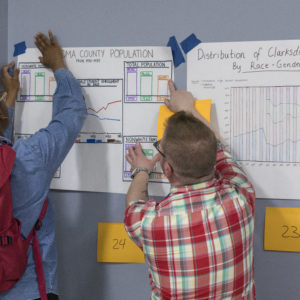


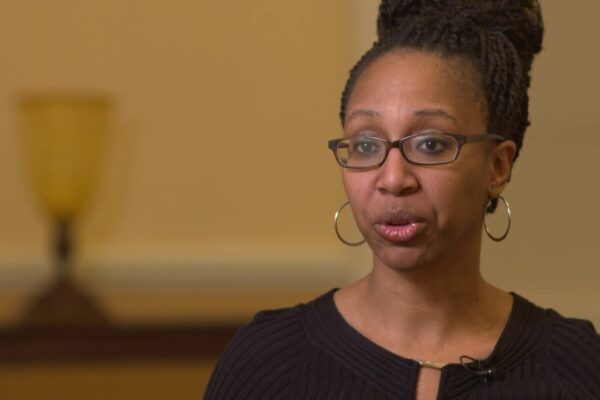
Comments and respectful dialogue are encouraged, but content will be moderated. Please, no personal attacks, obscenity or profanity, selling of commercial products, or endorsements of political candidates or positions. We reserve the right to remove any inappropriate comments. We also cannot address individual medical concerns or provide medical advice in this forum.